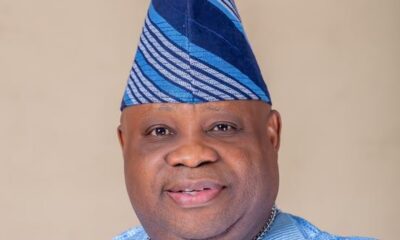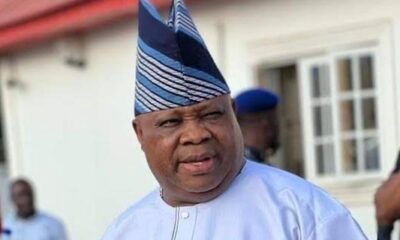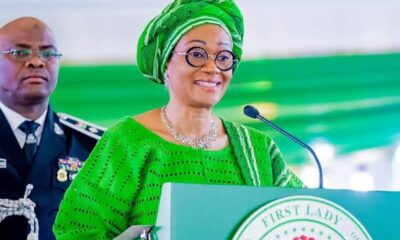Opinion
Osun yesteryears, Osun today: What Adeleke should have done differently in 15 months

By Waheed Adekunle
Socrates, a great philosopher once said: “an unexamined life is not worth living.” This simply means that it is important to use our highly developed thinking faculty to raise our existence above that of mere creatures. Eating, sleeping, working and procreating can’t distinguish us from animals. Without thinking, life is not worth living. This thought was completed by Benjamin Franklin, a political philosopher and founding father of the United States who said: “he who fails to plan, plans to fail.” In other words, there should be metrics to measure one’s performance within a specific period of time to know what is being achieved and areas to work harder on for the all round success.
Relating these philosophical cliches to the art of governance in Osun, particularly since the return to democracy in 1999, there is no doubt that the past administrations have genuinely done their bits at setting the enduring pace and place Osun on a sure footing of socioeconomic advancement, political emancipation and corporate growth and development.
The administration of Chief Abdul-Kareem Adebisi Akande began on socioeconomic and political overhauling strictly committed to lifting the state out of her excruciating situation occasioned by the long military presence in the state. Akande’s curiosity for a modern Osun knew no bounds as he built a concrete foundation for Osun as manifested in several kilometers of roads constructed within the first twelve months of his administration. There was a saying during Akande’s regime that says “Ijoba sogbo dile, sogbe digboro, sakitan doja” meaning “the government that is irrevocably committed to socioeconomic development; infrastructural advancement – turning bushes to housing estates and markets to enhance commercial activities, encourage industrialization and investments through rural-urban renewal and migration for the all round success of the state. The Osun State Government Secretariat Complex is a testament to Chief Akande’s legacies.
Similarly, the administration of former Governor Olagunsoye Oyinlola of seven and a half years witnessed different developmental strides but the peak of it was the successful establishment of the state owned tertiary institution known today as Osun State University (Uniosun) with its campuses spread across the zones in the state.
As a bridge-builder whose tenure gave Osun a facelift of development, the eight years of former Governor Rauf Aregbesola didn’t only build on the past gains but equally opened up Osun to the world map, especially in infrastructural renaissance. Though loans were taken to execute some of those projects, no effort was spared to set the state on the pedestal of sustainable infrastructural development purposely designed to guarantee her future population explosion.
In the same vein, the immediate past administration of former Governor Adegboyega Oyetola consolidated on the past gains as he recorded tremendous improvement across sectors of the economy despite the inherent challenges caused by the huge debt profile and lean purse of the state as at the time he assumed Office.
Oyetola’s administration, in four years, reconstructed, renovated and revitalized 332 Primary Healthcare Centres – one per political Ward across the nooks and crannies of the state – an enduring legacy and feat never attained by any state government, safe for Lagos, in the history of Nigeria.
Among several other infrastructural projects completed, the administration also built many historical roads that had been practically abandoned for ages by successive governments and which had become death traps not only for the dwellers of those affected communities but also for the people plying through the ancient roads for one reason or the other.
Above all, the four years administration of former Governor Oyetola now Minister of Marine and Blue Economy built the state-of-the-art Olaiya iconic flyover bridge despite the palpable meagre resources that accrued to the state among other challenges that bedeviled the administration, chiefly the COVID-19 and EndSARS protest.
However, the current administration under the leadership of Senator Ademola Adeleke appears to have been revolving the orbit in search of reality, as it is not clear to anyone, the direction the government is tilting towards in the last 15 months.
The citizens were promised a drastic change in the art of governance within six months of coming into office. Osogbo residents were promised a total turnaround of infrastructural development capable of turning the ancient town to ‘Small London and Small Dubai’ – all within six months. Dollars, Euros and Pounds ( from the thriving family business) were promised to complement the resources of the state for greater development. He also promised to reform Local Government Administration by returning governance to the grassroots. Youths were promised to be fully engaged into civil service, public service, agriculture, commerce and industry – through massive investments capable of generating jobs and profits for the state and her citizens. Mining, education, health, agriculture, commerce and industry among other sectors were promised to be revamped within the possible shortest time. But lo and behold, none of the aforementioned have come to pass in the last fifteen months of being at the helm of affairs of the state.
It is disheartening that the first and ever project reeled out for execution, that is, the borehole project, failed fantastically. The borehole drilling which was conceptualized by Adeleke’s government a few months after taking the mantle of leadership of the state, was to complement the existing ones dug in many of the primary health centres revitalized by his predecessor across the state. It turned out that many of the acclaimed boreholes of the government of the day were imaginary. They only existed only on paper, but not in reality. Where a handful were constructed, many of those boreholes are not functional, so are not serving the purpose for which they were constructed.
Aside from this, nothing spectacular has been witnessed as development since the inception of the present administration other than Executive Order that has taken the state back to the primitive era. A lot of infractions have been committed leading to the: sack of many workers including the Rector of Osun State Polytechnic, Iree; demotion of top bureaucrats including Permanent Secretaries appointed by Oyetola’s administration; removal of the traditional rulers, express dissolution of Statutory and Non-Statutory Commissions, dismissal of the elected Council Chairmen and a heinous attempt to oust the incumbent Chief Judge of the state, Justice Adepele Ojo.
If the incumbent government had been faithful to promises made, it would have made an impact at least in the lives of a fraction or segment of the populace if not all. Had it been there is sincerity of purpose within the ruling class, the state would have achieved far better and it wouldn’t have remained stagnant as it is. Had it been it was a government that prioritises the welfare and general wellbeing of the masses, a lot of life-changing policies would have been formulated and implemented to impact meaningfully in the lives of the people judging from the crazy funds and accrued revenues received thus far. Had it been there is a serious government in place, effort would have been intensified to cushion the effect of subsidy removal on the lives of the people of the state, at least to complement frantic effort of the federal government in that regard. If it was to be a truly people-oriented government, accountability, transparency and probity would have been its watchword and there would not have been any reason for hiding the identity of the contractors handling public projects let alone the contract costs.
It is regrettable that profligacy has become the order of the day in the state as its stems of cancerous tumor has resorted into bloated political appointments, among other frivolities, taking away the larger chunks of the state’s resources and leaving many in avoidable hopelessness, hunger and poverty. The sleepless public lens of adjudication is watching day and night.
May God heal our land!
Opinion
Moving beyond celebration: Workers’ day and the imperative for a living wage in Nigeria


By Kenechukwu Aguolu
With Workers’ Day, drawing near, Nigerian workers eagerly await any news regarding a potential rise in the minimum wage. However, recent statements attributed to the President of the Trade Union Congress hint that such an announcement might not occur on that day. This delay disappoints many workers grappling with economic challenges. The government should acknowledge this disappointment and provide a transparent timeline for any pronouncement and subsequent implementation of adjustments to the minimum wage.
The existing minimum wage of thirty thousand naira is glaringly inadequate. To
contextualise, individuals living below 1.9 dollars per day, as per World Bank standards, are deemed to be in poverty. With a minimum wage equivalent to roughly one thousand naira per day, individuals fall significantly below this poverty threshold. Sustaining oneself, let alone supporting a family, with such meager income is incredibly challenging. Essentially, the current minimum wage
sentences individuals to a life of absolute poverty, making it nearly impossible to fulfill basic needs and aspirations.
Evaluating the fairness of employers towards Nigerian workers presents a nuanced scenario. In the private sector, compliance with minimum wage regulations is common; meeting legal requirements. However, some employers exploit the low minimum wage by offering salaries just above this threshold, taking advantage of high unemployment rates. This often results in highly qualified individuals receiving inadequate compensation for their skills and contributions. As for the government’s role, there is room for improvement. Recognising workers as the backbone of society, establishing a reasonable national minimum wage is crucial. When workers are not adequately compensated, it not only affects their individual welfare but also has widespread societal implications. Thus, there’s a clear expectation for the government to prioritize fair wages and working conditions for Nigerian workers, acknowledging their indispensable role in maintaining the nation’s prosperity.
Prior to the current administration, instances occurred where state governments consistently failed to pay worker salaries on time, with some only providing partial payments. Such neglect towards worker welfare is disheartening, with reports indicating tragic consequences such as workers resorting to suicide out of frustration and children dropping out of school due to financial strain. These outcomes underscore the severity of the situation. If research were conducted, there might be a correlation between this neglect towards worker welfare and the increase in insecurity levels. When individuals of all ages face dire financial circumstances due to unpaid wages, some may resort to criminal activities as a means of survival. While this doesn’t justify criminal behavior, it’s crucial to acknowledge the pressures driving individuals towards illegal actions. Financial pressure stands out in the fraud triangle, contributing significantly to fraudulent behavior. Addressing issues related to worker salaries is urgent to alleviate financial burdens on individuals and mitigate associated societal impacts, such as heightened insecurity. Timely payment of wages is essential for the well-being of workers and fostering stability and prosperity across society.
While advocating for a minimum wage of one hundred thousand naira might appear ideal, determining the appropriate minimum wage is complex. It involves considering factors such as the cost of living, inflation rates, and the financial capacity of employers, including governments at all levels. While pushing for a substantial increase may seem appealing, acknowledging economic realities and feasibility is crucial. State governments, often citing limited funds, must prioritize
workers’ welfare while maintaining fiscal responsibility and sustainability. Boosting internally generated revenue through initiatives like enhancing tax collection, investing in infrastructure, and promoting entrepreneurship could address this challenge. Strengthening revenue streams enables state governments to handle the costs associated with higher wages while investing in critical services and development projects. Achieving a balance between fair wages for workers and fiscal prudence necessitates collaboration among government, businesses, and labour unions to establish an equitable and sustainable minimum wage for all stakeholders involved.
I have faith in President Bola Ahmed Tinubu’s commitment to provide workers with not just a new minimum wage, but a wage that will enable them to live with dignity even though if it may take longer than expected. President Bola Tinubu has demonstrated a strong dedication to good governance, and I am confident that he will prioritize the welfare of workers as part of his vision for a prosperous Nigeria. Moreover, establishing a robust mechanism for enforcing the national minimum wage is paramount.
Opinion
Osun: Where is Gov. Adeleke’s phoney N16bn digital economy project?
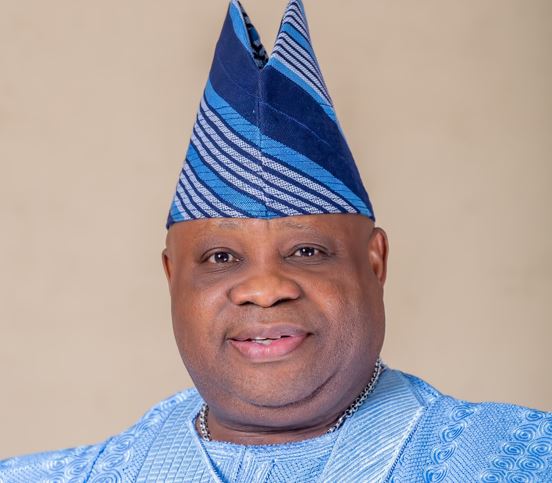

By Waheed Adekunle
It is appalling that in the last 14 months of unveiling the phoney digital economy policy by the incumbent Governor Ademola Adeleke led-PDP government in Osun State, nothing meaningful has been recorded in the sector thus far.
There is no doubting the fact that the current administration in the state has been failing consistently in delivering its electoral promises to the good people of the state particularly in the area of digital economy which was overblown beyond proportion and boastfully promised to turn around the fortune of the state in the technology world.
There are indices suggesting that the initiative has failed woefully like many others previously initiated by the incumbent government.
Recall that Governor Adeleke had on March 6, 2023, unveiled the state’s digital economy policies and flagged off laying of a broadband fibre optic project worth N16 billion purportedly claimed to cover 64 kilometres of the state and place landmarks of the state on Google maps.
Governor Adeleke who signed the Memorandum of Understanding with Oodua Infraco to commence immediate deployment of Fibre Optics across the state boasted that with the new National Broadband policy, free connectivity would be returned to schools and health centres but till today, nothing has been achieved in that respect.
In his words: “This government is waiving payment for Telecom Right of Way in return for free connectivity to our schools and health centres when the broadband project is completed. My good people of Osun State, we are also harnessing the many talents Osun has in the tech sector. We are putting selected Osun tech leaders from all over the world into an advisory board. Today, I am inaugurating the First Digital Economy Advisory Board with 15 members. Their task is to support the state in our dream of transforming Osun into a digital economy state.
“Permit me to commend my team for their wonderful performance on these landmark initiatives. I appreciate the team from the Ministry of Innovations, Science and Technology as well as specialists within the ICT Taskforce. You are consequently directed to work on the next phase which is the commencement of implementation of the policies and the initiatives.”
Anyway, it is not surprising that the incumbent government didn’t come up with anything tangible since the inauguration of the ‘non-existent fibre project’ other than the failure which it had also recorded in all sectors as manifested in the failed Imole Youth Corps; failed O’MEAL Scheme, failed borehole project, and failed attempt to remove the Chief Judge of Osun among others.
Saying lies, falsehoods and propaganda are the trademarks of the current administration is to say the least as it has now become glaring to all and sundry that like Ismail Omipidan said last year, “Osun under Governor Ademola Adeleke is being run in fraudulent claims.”
It would be recalled that the Adeleke government which started on a vendetta mission aimed at blackmailing and silencing the opposition has been witch-hunting suspected members of the All Progressives Congress, APC, instead of facing governance and this has shown clearly the real mission of the government.
Also recall that the Adeleke government started on a zero plan for the state. This was apparently noticed when the governor asked members of the Transition Committee to fashion out what his government could do within the first six months as this practically revealed the lack of capacity and preparedness in the current administration.
One would also wonder how a government which claimed to have campaigned vigorously to win the party’s governorship ticket and subsequently emerged governor would be asking a committee to design what was expected of him to do in six months! This shows a high level of his unpreparedness and that of his team for effective governance of Osun.
Back to the digital economy bogus claims, since the launch of the project precisely 13 months ago, why has Osun not been placed on world Google map as earlier promised by the Adeleke government? What has been the challenges impeding the project? Where have the humongous funds for the questionable project gone into? Who is the contractor handling the project if it exists at all?
Until these salient questions are answered satisfactorily, the government would continue to be held accountable. We should not forget that the masses are watching and taking records of events as they unfold under the Adeleke government. They are awaiting the day of reckoning.
May God heal our land.
Opinion
Adeleke v Aregbesola: The price of political treachery
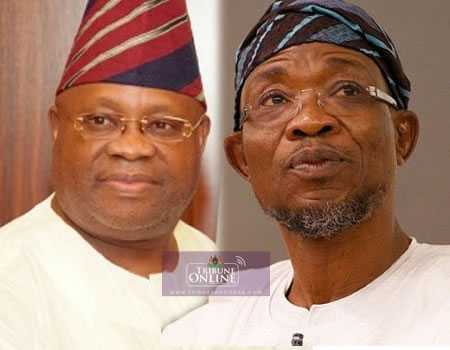

By Dr Jimoh Olorede
Preparatory to the July 2022 governorship election in Osun State, and since thereafter, until recently, the ex-governor and immediate-past Minister of Interior, Ogbeni Rauf Adesoji Aregbesola, a top beneficiary of the All Progressives Congress (APC) party, as a two-term commissioner in Lagos, two-term governor in Osun, and Minister consecutively, suddenly became an abettor and a conspiratorial ally to an opposition gubernatorial candidate, Senator Ademola Adeleke, against his party, APC, and his successor, Adegboyega Oyetola, who served as his Chief of Staff, succeeded him as governor, and was seeking a reelection! The gubernatorial election was held, Adeleke won, Oyetola lost, but subsequently appointed as minister, while Aregbesola left the political stage as minister and got back home!
Oyetola’s open and obvious sin for which he must be crucified, and was actually dealt with, at least, in the myopic estimation of Aregbesola and his co-conspirators, was ‘reviewing and reversing his Schools Reclassification Policy’, by which Oyetola actually rekindled people’s hope, and what they perceived as a retrieval of their ‘lost glory and education origin’, with his return and reversal of the changed public schools’ founder-cum-original names and unique uniforms to the status quo. This happens when a government is consent of the governed.
His (Oyetola’s) hidden, how-do-we-say-it sin for which he must be punished was what Ogbeni would term ‘deployment of his magic wand’ with which he was able to pay full salaries of the state workers, which Aregbesola could not, or perhaps did not, given the inherited jugular-strangling and throat-squeezing debt into which he plunged the state. These were Oyetola’s obvious and hidden sins for which the ‘political structure and APC house’ built in Osun by Asiwaju Bola Tinubu, through Aregbesola and others, must be demolished and totally rent asunder.
Since the creation of Osun State, ten people have served as governor, with four military governors and six civilian governors. While the first (military) governor, Leo Segun Ajiborisha, served the shortest term of four months, from 27 August 1991 to 3 January, 1992, Ogbeni Rauf Adesoji Aregbesola so far, served the longest term of eight years as governor, from November 27, 2010 to November 27, 2018. However, within this period of eight years of the longest-serving governor, so many things had happened in and to the state. One of those things was the changing and renaming of the state from Osun State to “State of Osun.” The ex-governor must have seen an error which none of his seven predecessors who had ruled the state before him could see.
He also created and introduced a different state Anthem, Logo, Crest and Flag. Apart from the humongous loan repayment, Oyetola also inherited these “Aregbesola-personified legacies” about which he had to be silent, as it was a moral burden, and rather maintained and sustained the status quo throughout his administration, feigning pretense as if he didn’t see anything wrong just to avoid crisis or rift with Aregbe.
Alas, Governor Ademola Adeleke eventually betrayed his ‘mission-fellow,’ an abettor and co-conspirator, Ogbeni Rauf Aregbesola, who maliciously joined forces with him against his own party and successor. He has obliterated all Ogbeni’s known legacies in the state. No sooner had the governor taken the oath of office than he started repealing Aregbesola’s legacies right at the venue of his inauguration. While delivering his inaugural speech, governor Ademola Adeleke publicly said: “Consequently, I hereby issue the following directives which will be backed up with appropriate Executive Orders.
“. . . Three, and immediate reversal to the constitutionally recognised name of our state – Osun State. All government insignia, correspondences, and signage should henceforth, I repeat, should henceforth reflect ‘Osun State, rather than ‘State of Osun,’ which is unknown to the Nigerian Constitution.”
Nigerian politics is a treacherous game. There’s no permanent friend or enemy in politics, as politicians deceitfully use and dump each other. Adeleke knew Aregbesola was smart; he consequently cynically stooped to outwit his smartness, and Ogbeni unwittingly misconstrued his betraying kindergarten dancing posture for stupidity.
Also, while Oyetola maintained and sustained the legacy, and retained the nomenclature “OYES” (Osun Youth Empowerment Scheme) as birthed and christened by Aregbesola, governor Ademola Adeleke dissolved the OYES Corps to be renamed after his ‘Imole Youth.’ The governor, through his spokesperson, condemned what he referred to as ‘content of the programme’ which, according to him, turned people to grass-cutters and market sweepers. Similarly, on many occasions, I have heard Adeleke-led PDP condemn Aregbesola’s government in the media, bemoaning that he failed to complete any road in eight years, and so on.
Eventually, the scenario turned out to be Adeleke paying Aregbe in his own coins! Based on malice and ill-will, and for his immediate ego satisfaction, Aregbesola sacrificed his party’s future gains, jeopardising the fortune of many, thinking he was ‘dealing’ with, and whipping Oyetola with political lashes. Paradoxically, as Ogbeni whips, Oyetola laughs while many, including Ogbeni himself, weep as direct recipients of the whipping! As a Yoruba adage says “Papa npara e, o lo np’aja” meaning a tick, like a sheep-ked, is unwittingly ruining itself thinking is undoing its host-dog by sucking its blood.
In June 2023, Ogbeni Aregbesola while speaking at the palace of Ataoja of Osogbo, Oba Jimoh Oyetunji Larooye II, after he had returned to Osun State consequent upon the expiration of his term as minister, said “I was born in Ikare Akoko. It’s surprising that a boy born in Ikare Akoko became a commissioner in Lagos and governor in Osun. That’s the work of God. He used Asiwaju to lead me to the path of success. I thank God who brought me to Lagos through the assistance of Asiwaju Bola Tinubu. He is the architect of my success.” He added that Tinubu directed him to come and take over “my fatherland – Osun State, that it was my next place of assignment.” Can you imagine, Aregbesola saying this after the deed (a grave damage) had been done! This is exactly how traitors behave – joining forces with conspirators to betray their benefactors.
Dr. Olorede, a strategic communication analyst, writes via [email protected]/08111841887
-
capital market2 years ago
Rt.briscoe, FBNH, Others halts negative performance of stock market
-
Finance3 months ago
Court orders Sen. Victor Umeh to repay N136m bank debt to AMCON
-



 Abuja Update2 months ago
Abuja Update2 months agoUNDP, FG partnership needed to achieve inclusion, equity- Minister
-
Abuja Update1 month ago
Banks drive stock market performance with N147bn gain
-



 Business1 week ago
Business1 week agoTingo Group unveils Tingo Electric, Tingo Cola drink at Lagos launch
-



 Health2 weeks ago
Health2 weeks agoCapacity training will reduce migration of health workers- NPHCDA
-
News4 months ago
Oil thieves sponsoring malicious media campaign against Navy – Spokesman
-



 Infotech1 month ago
Infotech1 month agoWorld Backup Day: NITDA urges Nigerians to ensure backup of data

